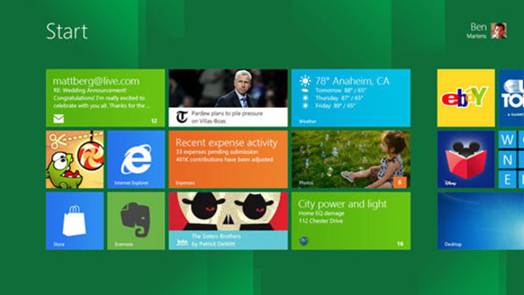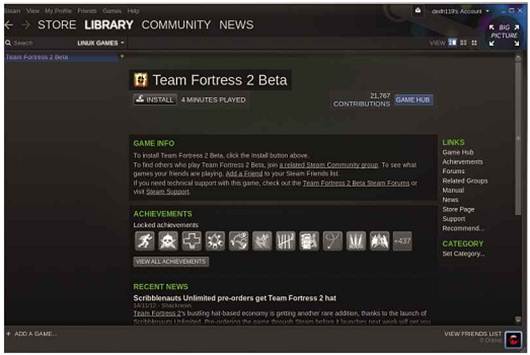We contemplate the current state of
Linux and its possible future
It’s usually around this time of year that
we sit back and evaluate the current state of Linux and its possible future.
‘The year of Linux’ is often the title that’s bandied about and the author
generally looks at what the various distributions have been up to, what
significant changes have been made to the core modules, the kernel and so on.
They then go on to announce something in the region of a 1% rise in use
worldwide, with emphasis on some of the poorer countries who have adopted open
source and free software as a way to cheaply embrace technology.

The
End Of The Beginning Or The Beginning Of The End?
Needless to say, this all fine and well,
but an odd sequence of events have occurred this year, which have accumulated
into something rather special for Linux. These event have catapulted it from
the monitors of the enthusiasts and specialists and into the more generalised computing
limelight. At the same time, however, these same events, although individually
are certainly newsworthy, could very well have announced the final innings of
Linux Armageddon.
The events, throughout the year, have each
spelled the rise of Linux in letters writ large, but when looked at more
closely and in a little more detail, can make for solemn reading. It all
depends on your point of view, but we’ll see what you think at the end of this
article.
Steam, Commercialization, Rants, Raves
And Bugs Galore
The first of these events is a no-brainer.
Of course, every member of the animal kingdom is probably aware of the Gabe
Newell’s scathing comments regarding Windows 8 and Microsoft’s caging in of the
development processes. “A catastrophe for everyone in PC space” was the now
famous comment, closely echoed by the developer Blizzard and Minecraft creator
Markus ‘Notch’ Person, who went on to say “I’d rather have Minecraft not run on
Windows 8 at all, than to play along.”
Obviously all this stems from the early
developmental releases of Windows 8, with what was then known as Metro and the
draconian certification scheme that Microsoft applies to games and programs,
which dictate conformity to the Microsoft gesture ‘touch language’ and the
avoidance of any adult content for a program to appear in the Windows 8 Store.
Alongside all this was the 30% cut Microsoft will take from accredited Windows
8 apps and the ‘follow our rules or you won’t be certified approach’ to
developers.
The computing world balked at Microsoft and
Windows 8. Another solution was desperately needed. Naturally, that solution
came in the form of Linux. Suddenly Gabe Newell and others publically fell in
love with Linux and started to extoll its many virtues and eventually the talk
turned to creating a Linux version of Steam.
Within weeks, there were screenshots
released of the FPS game Left 4 Dead 2 running within a window on a PC with
Ubuntu installed. Not long after that there came a steady trickle of other
screenshots and benchmarks stating that running the same game under Linux came
out faster and better than running it on a Windows PC.

The new Microsoft Windows 8 store screenshot
The result of all this attention to Linux
was apparent in the state of the number of visits to the likes of DistroWatch,
which saw a dramatic rise in visits to its main site over the last year. Those
people who thought that Linux was purely for uber-geeks were now taking an
interest in the operating system. In itself this didn’t do any harm to the
popularity of Linux, obviously, but with it comes a dark cloud.
“Distributions differ far too much and
the vast majority are so amateurish that it’s laughable”
When Ubuntu 12.10 came out, there were
serious misgivings regarding the integrated Amazon search built into the Unity
Dash. For many, they felt their OS of choice had sold out to the
commercialisation of the internet, as simply typing in ‘webcam’ to access their
hardware resulted in them being inundated with other choices from the Amazon
store. For them it felt like commerce was watching their every move and force
feeding them a diet of unwanted deals and offers. It’s certainly no secret that
with each product sold by Amazon via the search Canonical takes a small cut, as
stated by Canonical community manager Jono Bacon on his blog. This revenue will
be used so “that we can continue to invest into the Ubuntu project to build new
features, maintain our infrastructure and improve Ubuntu.” He went on to state
that these product suggestions are not advertising and merely “search results
that relate directly to the content you are searching for in the Dash.”
To add insult to injury, Canonical recently
announced that Ubuntu 13.04 will offer users the opportunity to shop at Amazon
directly from the Dash. Canonical’s vice president of online serivces, Cristian
Parrino, recently mentioned on the Canonical blog that the new Instant
Purchasing feature will allow the user “to purchase music or apps directly from
the Dash, without opening a browser or a separate client.” While this may sound
like an interesting addition to the already well laid-out Ubuntu, it also reeks
of commercialised shenanigans.
Richard Stallman, the father of the GNU
project and founder of the Free Software Foundation, recently vented his wrath
at Canonical’s Amazon joining by stating on his blog, “One of the major
advantages of free software is that the community protects users from malicious
software. Now Ubuntu GNU/Linux has become a counterexample. What should we do?”
The crux of the matter here is that Stallman
insists that going to bed with Amazon is essentially wrong, as per his ‘Reasons
not to buy from Amazon’ entry, which you can view at goo.gl/Nc384. To him, this
behaviour constitutes spying and is therefore ultimately spyware. Although
Canonical has already stated that any money made from the joint Amazon
purchasing scheme will go back into Ubuntu’s development, Stallman goes onto
say, “It behooves us to give Canonical whatever rebuff is needed to make it
stop this. Any excuse Canonical offers is inadequate; even if it used all the
money it gets from Amazon to develop free software, that can hardly overcome
what free software will lose if it ceases to offer an effective way to avoid
abuse of the users.”

Steam
on Linux installs and runs reasonably well for a beta
Interestingly, Bacon argued back the same
day that Stallman was in fact spreading FUD (Fear, Uncertainty and Doubt):
“This is FUD. When controversies such as this kick off from time to time about
Canonical and/or Ubuntu, my approach has never been to try to convince our
critics that they are wrong. My goal is not to turn the unbelievers into
worshippers at the church of Ubuntu.” He did place on the top of this post that
this is a personal post and not necessarily the views of Canonical, so at least
we can forgive him for referring to Ubuntu as a religion!
Mark Shuttleworth, the founder of Ubuntu,
defended the decision to include the Amazon searches in the Dash on his blog,
Here Be Dragons. The basis of the post was one of trust: you have to trust Canonical
as much as you would trust any other operating system or keeper of your data.
As he so eloquently put it, “We are not telling Amazon what you are searching
for. Your anonymity is preserved because we handle the query on your behalf.
Don’t trust us? Erm, we have root. You do trust us with your data already. You
trust us not to screw up on your machine with every update. You trust Debian
and you trust a large swathe of the open-source community. And, most
importantly, you trust us to address it when, being human, we err.”
“2013 looks as if it might be fraught
with glitches, bugs and serious lapses”